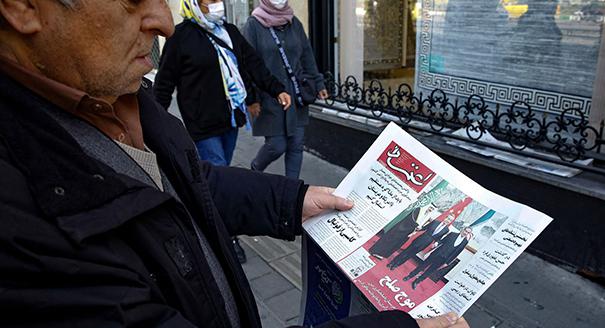Ali Hashem is a senior Al-Jazeera English correspondent who has long covered Iraq and Iran. He is also a research fellow at the Sectarianism, Proxies, and De-Sectarianization Project (SEPAD) based at Lancaster University. His research focuses on the Middle East, with an emphasis on Iran, Lebanon, and Iraq. Diwan interviewed Hashem in mid-March to get his perspective on the recent rapprochement between Saudi Arabia and Iran, whose path he has followed closely from Tehran and Baghdad.
Michael Young: What is the background of the Saudi-Iranian agreement to restore diplomatic relations, and what was necessary to bring it to a successful conclusion?
Ali Hashem: In my opinion, for now this is more of an agreement to regulate the tension and draw new lines of engagement. The easy part has ended and the hard part is about to begin. Diplomats will have to discuss much more complicated issues, and I think here is where the Chinese role as a guarantor will matter.
MY: Saudi-Iranian talks began in Baghdad under former Iraqi prime minister Mustapha al-Kadhimi, so when did they shift to China and what was instrumental in bringing this about?
AH: Over the five sessions that were held in Baghdad, Iranian and Saudi delegations were able to reach some understandings. As we now know, these were meetings between security officials, so they mainly touched on issues related to security. When things reached a point where the discussions had to be raised to the diplomatic level, the Saudis were reluctant. I believe the stalemate was due to several factors, one being the situation in Iraq. However, the main obstacle was the absence of a strong guarantor, and that’s where China seized the opportunity and its role evolved into that of broker of the agreement.
MY: Do you feel that the agreement will lead to an improvement on various other regional issues of contention—above all a resolution to the war in Yemen and perhaps even a calming of Iranian-Saudi divisions over Lebanon?
AH: Tehran will not become an ally of Riyadh, or vice versa. Iranian policy is described by experts as complicated, and Saudi Arabia, in turn, has returned to the calm way of approaching foreign policy, similar to what prevailed in past decades. However, there are major disagreements, different visions, so there must be a framework that allows for a regulation of disputes under main headings that the politicians should agree upon.
We are at the stage of crafting rules of engagement under the eyes of a reliable guarantor. Embassies will open soon. This means there will be clear channels of communication between the two countries, which could limit unfriendly media exchanges and military threats. Hostile activities will come at a certain price, and perhaps this could help pave the way for the intersection of interests that increasingly raises the costs of tension. Perhaps China is also counting on imposing a kind of economic interdependency between the two countries, so that the benefits of avoiding confrontations are higher than the gains of engaging in confrontation. That could represent a step toward containing hostilities.
MY: It appears that the Saudis maneuvered in such a way that they were simultaneously sending signals to Washington that they might reach a settlement with Israel given certain conditions, while pursuing talks with Iran, through China. Do you feel the Americans were played through this multifaceted approach?
AH: It is unknown whether Saudi Arabia will join the Abraham Accords or not, but some believe the Chinese mediation between Riyadh and Tehran has allowed the Gulf countries in general to consider alternatives to American unipolar imperatives. It is true that normalizing with Israel may not displease all sides in the region, but for some it carries great risks. This does not represent a permanent closing of the door on the idea, but it does give parties the opportunity to maneuver more. Saudi Arabia has sent mixed signals on this front during the last year and a half.
However, to assume that the deal between Iran and Saudi Arabia is a big loss for America is in my opinion an exaggeration, for many reasons. In light of the conflict with Russia, any preoccupation with another conflict would distract the United States from the war in Ukraine. And if Washington wanted to prevent a Saudi-Iranian reconciliation, it could have vetoed the talks when they were taking place in Iraq, which did not happen.
Yet America, burdened with its many battles and a growing Israeli headache, is anticipating more voids that its opponents will seek to fill, just as China has done. That is where American anxiety begins in earnest. The real American loss in the Saudi-Iranian reconciliation was Chinese involvement in an area that was until recently Washington’s arena. No one could compete with the Americans, especially when it came to relations with Riyadh. Perhaps this prompted U.S. National Security Adviser Jake Sullivan to declare that Washington could not play the role of mediator between Saudi Arabia and Iran because of its tense relationship with the latter, after which he welcomed what he described as competition with China while denying the existence of a conflict with Beijing.
MY: How do you think that one of Iran’s main regional allies, Hezbollah, sees this agreement? In what ways might this change its behavior in Lebanon and the region?
AH: My feeling is that Hezbollah is dealing with it cautiously, which is realistic. Hezbollah, or other allies of Iran, won’t oppose any such approach. Given their experiences with the region, they won’t be overly concerned by the deal because they know it could collapse at any time. But if the deal is implemented and normalization of Saudi-Iranian ties remains on track, Hezbollah and its allies in Iraq and Yemen will be less busy exchanging verbal attacks with Saudi Arabia and its allies. That said, I’m pessimistic the deal will have an immediate impact on Lebanon. It will take time for Lebanese factions to receive signals in this regard.






